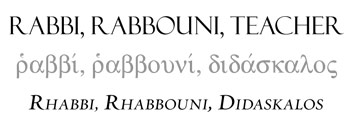From Praying the Names of Jesus Week Ten, Day Three
The Name
In Jesus' day, the name "rabbi" or "teacher" was normally reserved for someone who had studied under another rabbi for many years. Jesus offended the religious leaders of his day by ignoring this system. Instead of apprenticing himself to a rabbi, he simply laid down his carpenter tools and called twelve ordinary men to become his disciples. Unlike other rabbis, who merely passed on the teaching of the rabbi under whom they had studied, Jesus spoke with an authority that startled many of his listeners.
Two thousand years later, we are called to become his disciples, to stay as close to him as a disciple would to a rabbi, studying his life, examining his teaching, and allowing his Spirit to remake us in his image. When you pray to Rabbi Jesus, remember that you are praying to the only Teacher who is all-wise, all-good, and all-powerful, able to transform not only your mind but also your heart.
Key Scripture
[Jesus said to his disciples] "But you are not to be called ‘Rabbi,' for you have only one Master." Matthew 23:8
***
Wednesday
Praying the Name
They came to Bethsaida, and some people brought a blind man and begged Jesus to touch him. He took the blind man by the hand and led him outside the village. When he had spit on the man's eyes and put his hands on him, Jesus asked, "Do you see anything?"
He looked up and said, "I see people; they look like trees walking around." Once more Jesus put his hands on the man's eyes. Then his eyes were opened, his sight was restored, and he saw everything clearly. Mark 8:22-25
Reflect On: Mark 8:22-25 and John 9:1-3.
Praise God: Because there are no shadows in him.
Offer Thanks: For the ways Jesus continues to reveal himself to you.
Confess: Any tendency to ignore the difficult teachings of Christ.
Ask God: To open your eyes to your need for grace.
One golden afternoon when my daughter was a toddler, barely able to speak, she peered over the edge of a railing at the Grand Canyon and uttered the single word that captures our common response to such grandeur. "Wow!" she said. After that she was speechless. In the face of such splendor, anything more would have been redundant. Unless our responses have been blunted by skepticism or dulled by overfamiliarity, many of us respond to the miracles of Jesus in a similar way. We are wowed by stories of how he healed lepers, walked on water, calmed storms, and multiplied bread. Surely such miracles provide clear evidence of his divinity. But there is more to the story of these miraculous events.
Hundreds of years ago, St. Augustine commented on our tendency to miss the deeper meaning of the miracles, advising believers to "ask the miracles themselves what they tell us about Christ, for they have a tongue of their own, if it can only be understood. Because Christ is the Word of God, all the acts of the Word become words to us. The miracle which we admire on the outside also has something inside which must be understood."
If Jesus is our Rabbi, surely he teaches us not only through his parables and sayings but also through his actions. Take the incident in Mark's Gospel in which Jesus gradually heal a blind man. But why couldn't Jesus get the job done with a single touch? Didn't he have the power? The answer may lie, not in any lack of divine power but in a lack of human readiness. Perhaps Jesus healed the blind man in stages in order to reveal a deeper point — to show us that our own healing often happens in stages as well.
To be converted to Christ is first of all to be healed of our spiritual blindness — but not completely. We are still only half-seeing, only partially perceiving the truth about God and about us. Knowing we can only bear so much light, Jesus never forces us to see the whole truth but only enables us to see it as we are willing and able. Despite our faith, most of us still resist the gospel at some level. We tolerate and sometimes even cherish the shadows precisely because the Good News is also Bad News for the sins we still harbor — our pride, pettiness, and greed.
Today as you ponder the miracle of how Christ healed the blind man from Bethsaida, ask him to touch the eyes of your soul so that they may open wide to the truth of the gospel. Pray for the faith to see and the grace to learn.
For more from Ann Spangler, please visit her blogspot on Christianity.com. And be sure to check out Ann's newest books on AnnSpangler.com. To hear more from Ann Spangler, sign up today at annspangler.substack.com.
Meet your spiritual ancestors as they really were: Less Than Perfect: Broken Men and Women of the Bible and What We Can Learn from Them.









